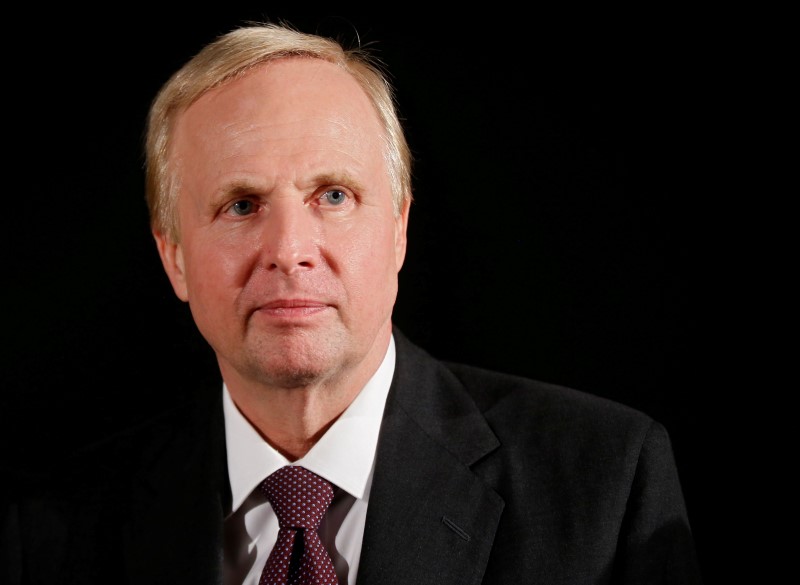By Dmitry Zhdannikov
LONDON (Reuters) - U.S. oil major Exxon Mobil (N:XOM) and Britain's BP (L:BP) are at loggerheads over a giant oil production deal with Azerbaijan, blocking renewal of what was once called "the contract of the century", three high-level industry sources told Reuters.
BP, which operates the Azeri-Chigar-Guneshli (ACG) fields in the Caspian Sea and relies on them for a tenth of its global output, has tentatively agreed terms with the Azeri government on extending the 30-year contract, they said.
But Exxon, which gets around one percent of its hydrocarbon production through its stake in the ACG consortium, has been holding out for a better deal since the halving of world oil prices in 2014.
The result is deadlock in talks over a project that may produce another $100 billion worth of oil at current prices, coming on top of old tensions between Exxon chief executive Rex Tillerson and his BP counterpart Bob Dudley, the sources said.
"There have been numerous attempts to find a breakthrough, with BP and Azerbaijan agreeing new terms but Exxon rejecting them time and time again. It has been going on for almost two years, with Exxon insisting on better terms," a Western oil industry source familiar with discussions said.
A high-level source in the former Soviet republic said: "Exxon wants better terms. It has its own views of how the consortium should work which are different from the views of the operator BP."
Neither source would go into details of the terms under discussion.
While the existing deal still has eight years to run, usual energy industry practice is to try to renew such long-term production sharing agreements as early as possible - preferably around a decade before they are due to expire - to plan huge new investments in advance. So far the consortium partners have invested $32 billion in the project.
At stake is three quarters of overall Azeri crude output or about 600,000 barrels per day - equal to 0.7 percent of global output - extracted under the agreement between the ACG consortium members and the Azeri government.
Azerbaijan signed the original deal in 1994, only three years after the collapse of the Soviet Union. Since then, energy wealth has transformed what had been an impoverished nation into one confident enough to host a Formula One Grand Prix a fortnight ago, although the oil price crash has badly hurt its economy.
For Europe, the country is a vital source of oil and gas as the continent tries to lessen its dependence on Russian energy.
BP declined to comment on details of the extension talks, saying the ACG fields had already produced over 2.9 billion barrels since 1994. That would be worth $155 billion, using an average price of $55 per barrel for the past two decades.
"Together with our co-venturers in Azerbaijan, we remain committed to building on this record of success and supporting the continued development of the local market," BP said.
Exxon said it does not comment on "commercial negotiations".
TENSE RELATIONS
While BP has a 35.8 percent stake in the project, Exxon holds only 8 percent. Other members include Azeri state oil firm Socar and U.S. major Chevron (NYSE:CVX) with over 11 percent each, Inpex of Japan with 11 percent and Norway's Statoil (OL:STL) with 8.6 percent. Turkey's TPAO, Japan's Itochu and India's ONGC have smaller stakes.
The ACG consortium has had problems in the past.
The fields had been expected to pump more than 1 million bpd at their peak but after hitting 820,000 bpd in 2010, output has fallen, prompting Azeri President Ilham Aliyev to accuse BP of making "false promises".
Azerbaijan even suggested it may develop the fields on its own after the deal expires in 2024.
But BP managed to mend fences and opened talks on extending the agreement until 2040 and possibly 2060. The aim is to extract as much as 2 billion barrels of additional oil, worth another $100 billion at today's prices of $50 per barrel.
However, oil companies around the world have been reviewing production contracts to slash costs and limit spending during the worst downturn in global prices in at least three decades.
Exxon's position began to toughen after 2014, and one source close to the discussions said the Tillerson-Dudley relationship had complicated matters. "It could have been sorted out at the very top level. But Rex and Bob have had frosty relations for years," the source said.
Sources pointed to several events over the past years which had soured matters between the two Americans.
After BP's deadly 2010 Gulf of Mexico disaster, Dudley said it was "one-in-a-million occurrence" and that BP did not act in a negligent manner. Tillerson, however, called the biggest oil spill in U.S. history "a breakdown of management oversight" and called Dudley's remarks "a great disservice to the industry".
A year later, BP lost a deal to drill for oil in the Russian Arctic after a surprise decision by its long-time local partner Rosneft to chose Exxon.
Then last year, BP was among a group of top oil firms that made a rare joint appeal in support of the United Nations-backed Paris climate deal. Tillerson refused to sign, saying he didn't want to be "disingenuous" or "fake it" as far as his long-standing scepticism on the issue was concerned.
In contrast to the ACG deal, a BP-led consortium which operates the giant Shakh Deniz gas field nearby agreed new terms with the Azeri government extending the agreement to 2036. Exxon is not involved in that consortium.
It is not unusual for host countries to use disagreements between consortium partners to extract better terms, under the threat of refusing to renew deals.

But the Azeri source played down this possibility. "Azerbaijan is not giving any ultimatums. We are still hoping for a deal before the end of September," the source said.
(Reporting and Writing by Dmitry Zhdannikov)